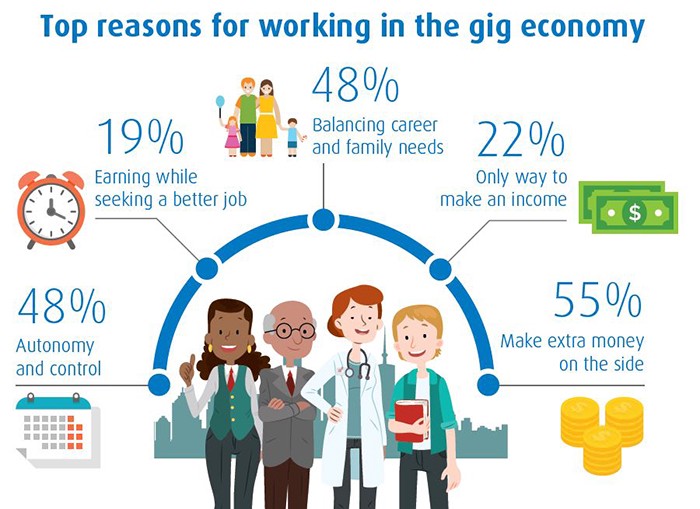Creativity + simplicity = a side hustle that actually works for busy moms. If you…

What Does Gig Economy Mean?
In recent years, the term “gig economy” has become a popular phrase you’ll often hear branded around. The question is, what exactly does it mean?
Here, you’ll discover everything you need to know about the gig economy. From what it means to why it got its name, learn more about this modern term below.
What is a gig economy?
Gig economy is a fairly recent term used to describe freelance and temporary working. Companies hire independent contractors and freelancers, rather than taking on full time employees.
The rise in self-employment has contributed to the gig economy, with flexible working becoming increasingly popular. Many start-ups are hiring freelancers and contractors to help get their business off the ground, before hiring full time employees.
It can refer to remote workers, as well as local contractors. Most jobs carried out are one-off tasks, though gigs can also run long term. So, to sum up, the gig economy is basically freelance and flexible working, rather than being employed.
What factors drive the gig economy?
There are a lot of factors driving the gig economy today. Advancements in technology have played a big role in making it a popular choice for workers.
The internet for example, has made it possible for people to work remotely, allowing them to ditch their 9 to 5 employment. The advantages of working on a self-employed basis has seen a massive rise in people ditching employment to become their own boss.
It’s also helped the business world too. Companies can now hire freelancers and contractors to carry out one-off tasks at a more affordable cost. They don’t necessarily need to hire additional staff in-house, which can save them thousands of dollars a year. Businesses also have a much larger talent pool to work with when they’re seeking new workers.
People are also a lot more focused on living the lifestyle they want. This includes travelling and not being stuck in a 9 to 5 job. The change in attitude regarding the workplace and remote working has really helped to drive the gig economy.
Who would benefit from a gig life?
While the gig life can provide a lot of benefits, it isn’t suitable for everyone. As you aren’t employed on a permanent basis, income isn’t guaranteed. Some months you may earn a lot less than others, which can be pretty stressful when you have bills to pay.
In order to thrive in the gig economy, you’ll need to be extremely self-motivated. You will also need to handle periods of stress well, as well as be happy to work alone. Those working within the gig economy do report it can get lonely as you can feel disconnected from the rest of the workplace.
How Gig Economy works?
In order to work within the gig economy, you’re going to need numerous clients. You’ll take on a variety of “gigs”, with each one contributing a small percentage towards your income.
If you’re doing it full time, you’ll need to continuously search for new clients. However, it is possible to work within the gig economy part time in order to simply supplement your income.
It typically works through technology. The majority of gig workers rely upon technology to help them both get clients and carry out their job. There are a lot of websites which connect companies to contractors and freelancers. Or, you could contact companies directly to ask if they need contractors in your niche.
This is just a very basic overview of what the gig economy is and how it works. Giving up full time employment to join the gig economy delivers both pros and cons. It is important to understand both to help you decide whether or not the gig economy is right for you.



